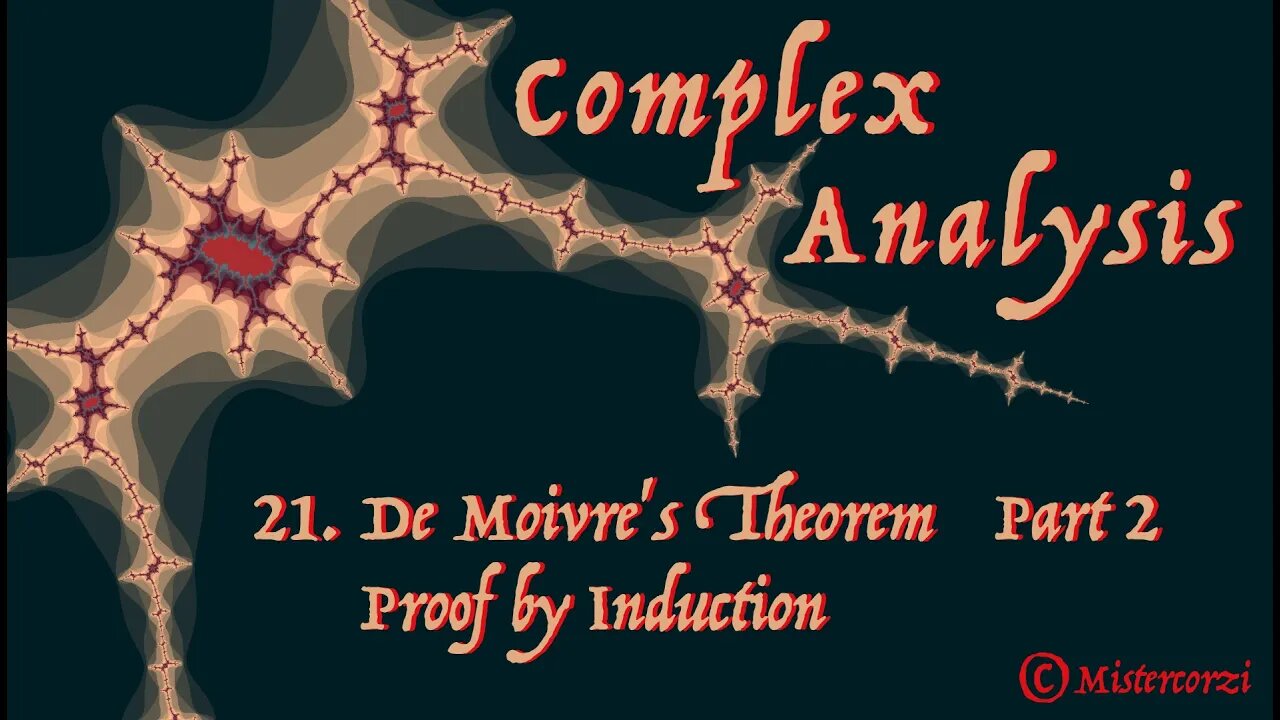Premium Only Content

21 De Moivre's Theorem Part 2 (proof for all Integers)
The proof of De Moivre's Theorem for all Integers (positive, negative and zero) is given. The three steps are: Mathematical Induction for the positive integers, the case n=0 and then the proof for the negative integers which involves the reciprocal.
The analogy of falling dominoes is used to help understand the inductive process.
Chapters:
00:10 Statement of the Theorem and Proof strategy
01:09 Step 1: animation of domino analogy
02:08 Step 1: proof by Mathematical Induction for the positive integers
06:11 Step 2: the case n=0
07:50 Step 3: proof for the negative integers by use of the reciprocal
11:42 The summary
12:00 Links to the Playlist "Complex Numbers"
Key words: De Moivre's Theorem, Mathematical Induction, Z+, Z-, Z, reciprocal, indices, arguments, M337, Open University, Unit A1, complex analysis
Previous videos in this series are:
01 What is a Complex Number?
02 Adding, Subtracting and Multiplying Complex Numbers
03 Dividing Complex Numbers
04 Complex Conjugates
05 The Field of Complex Numbers
06 The Complex Plane
07 The Modulus of a Complex Number
08 Distance on the Complex Plane
09 Properties of the Modulus of a Complex Number
10 Complex Numbers and the Unit Circle
11 The Polar Form of a Complex Number
12 The Principal Argument of a Complex Number
13 The Geometrical Effects of Multiplying by a Complex Number
14 Multiplication of Complex Numbers in Polar Form
15 The Principal Argument when Multiplying Complex Numbers
16 The Geometrical Effects of Dividing by a Complex Number
17 Division of Complex Numbers in Polar Form
18 Properties of the Reciprocal of a Complex Numbers
19 Conjugates and Reciprocals of Complex Numbers
20 De Moivre's Theorem Part 1 (Introduction & Visualisation)
-
 40:21
40:21
Randi Hipper
1 hour agoTHIS COIN IS GOING TO BLOW UP IN 2025! LATEST BITCOIN NEWS
872 -
 34:39
34:39
BonginoReport
5 hours agoWhy Did My Tax Dollars Fund a Terrorist’s Tuition??? (Ep.137) - 02/11/2025
68.7K106 -
 LIVE
LIVE
Wendy Bell Radio
6 hours agoCongress Needs To Go To Rehab
13,248 watching -
 1:23:25
1:23:25
Graham Allen
3 hours agoJudge BLOCKS Trump Fed Worker Buyout Offer!! + Google Has Up-Dated “Gulf Of America” FINALLY!
36.2K24 -
 LIVE
LIVE
2 MIKES LIVE
2 hours agoTHE MIKE SCHWARTZ SHOW with DR. MICHAEL J SCHWARTZ 02-11-2025
252 watching -
 6:00
6:00
AlaskanBallistics
8 hours agoBanish Suppressors Shot Show 2025
3.71K -
 LIVE
LIVE
Vigilant News Network
15 hours agoElon Musk EXPOSES One of the Largest Financial Scandals in History | The Daily Dose
1,263 watching -
 1:03:11
1:03:11
Miss Understood With Rachel Uchitel
4 days agoDefending the Indefensible: The Man Behind the Most Controversial Cases – Attorney Norm Pattis
16.1K2 -
![DEM CONGRESSMAN’s STAFFER IMPERSONATED FBI & STEPS FROM TRUMP WITH GUN ON JAN 6 [EP 4436-8AM]](https://1a-1791.com/video/fwe2/a0/s8/1/g/e/P/J/gePJx.0kob-small-DEM-CONGRESSMANs-STAFFER-IM.jpg) LIVE
LIVE
The Pete Santilli Show
17 hours agoDEM CONGRESSMAN’s STAFFER IMPERSONATED FBI & STEPS FROM TRUMP WITH GUN ON JAN 6 [EP 4436-8AM]
1,087 watching -
 1:26:46
1:26:46
Game On!
14 hours ago $2.07 earnedTop 5 reasons NFL experts believe the Eagles will win Super Bowl 60!
30.2K